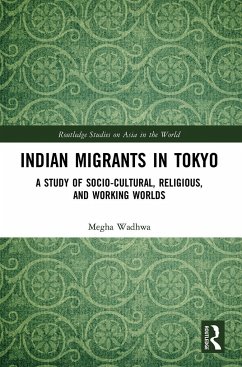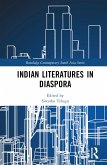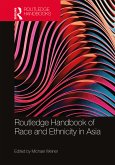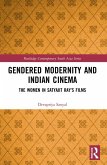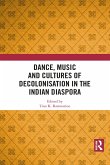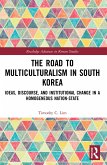How does an extended stay in Japan influence Indian migrants' sense of their identity as they adapt to a country very different from their own?
The number of Indians in Japan is increasing. The links between Japan and India go back a long way in history, and the intricacy of their cultures is one of the many factors they have in common. Japanese culture and customs are among the most distinctive and complex in the world, and it is often difficult for foreigners to get used to them.
Wadhwa focuses on the Indian Diaspora in Tokyo, analysing their lives there by drawing on a wealth of interviews and extensive participant observation. She examines their lifestyles, fears, problems, relations and expectations as foreigners in Tokyo and their efforts to create a 'home away from home' in Japan.
This book will be of great interest to anthropologists and sociologists concerned with the impact of migration on diaspora communities, especially those focused on Japan, India or both.
The number of Indians in Japan is increasing. The links between Japan and India go back a long way in history, and the intricacy of their cultures is one of the many factors they have in common. Japanese culture and customs are among the most distinctive and complex in the world, and it is often difficult for foreigners to get used to them.
Wadhwa focuses on the Indian Diaspora in Tokyo, analysing their lives there by drawing on a wealth of interviews and extensive participant observation. She examines their lifestyles, fears, problems, relations and expectations as foreigners in Tokyo and their efforts to create a 'home away from home' in Japan.
This book will be of great interest to anthropologists and sociologists concerned with the impact of migration on diaspora communities, especially those focused on Japan, India or both.
"[This] book is an eye-opening study based on comprehensive research and personal experience...Wadhwa interviewed over 100 Indian residents, and readers are provided with numerous biographical portraits that show how these individuals balance their love of Japan with their strong ties to India"
Patrick Parr, Japan Times, https://www.japantimes.co.jp/culture/2021/01/23/books/indian-migrants-in-tokyo/?fbclid=IwAR3EOiq86p2GxeyTkhlLs_E1a8u7B1XmH0Hs-UqkayWn3cjyooUERncyLpM
"Megha Wadhwa's new book on Japan's small but growing Indian community is a welcome delight. It provides a fascinating, important and different perspective both on Japan and how non-Japanese fare with life there. Drawing on years of fieldwork primarily in Tokyo, "Indian Migrants in Tokyo" manages to affectionately convey a great deal of useful information in just under 200 pages.
Wadhwa spent years interviewing a broadly representative sector of the Indian diaspora in Japan, including merchants, IT workers, restaurateurs, teachers, diplomats, students and trailing spouses. These interviews provide a wealth of insightful quotes and observations that help understand the Indian version of the "life in Japan" experience."
Colin P.A. Jones, Doshisha University in Nikkei Asia, https://asia.nikkei.com/Life-Arts/Life/Book-review-Indian-Migrants-in-Tokyo
"Not just relevant for those scholars interested in Japan as an emerging immigrant nation but also in a comparative perspective examining how other countries in Asia are dealing with shifting attitudes toward sending and receiving migrants."
Baas, Michiel, International Institute for Asian Studies, University of Amsterdam
"This book should be mandatory reading for Japanese policy-makers and employers because it makes a strong case for doing more to lessen the challenges facing these migrants and to compete with other nations that offer more appealing conditions. Well-researched and written, with numerous images, this book is also highly recommended for anyone interested in migration, globalization, Indian identity and exploring a rarely observed side of Japan.
Jeff Kingston, Journal of Transient Migration, Temple University Japan
Patrick Parr, Japan Times, https://www.japantimes.co.jp/culture/2021/01/23/books/indian-migrants-in-tokyo/?fbclid=IwAR3EOiq86p2GxeyTkhlLs_E1a8u7B1XmH0Hs-UqkayWn3cjyooUERncyLpM
"Megha Wadhwa's new book on Japan's small but growing Indian community is a welcome delight. It provides a fascinating, important and different perspective both on Japan and how non-Japanese fare with life there. Drawing on years of fieldwork primarily in Tokyo, "Indian Migrants in Tokyo" manages to affectionately convey a great deal of useful information in just under 200 pages.
Wadhwa spent years interviewing a broadly representative sector of the Indian diaspora in Japan, including merchants, IT workers, restaurateurs, teachers, diplomats, students and trailing spouses. These interviews provide a wealth of insightful quotes and observations that help understand the Indian version of the "life in Japan" experience."
Colin P.A. Jones, Doshisha University in Nikkei Asia, https://asia.nikkei.com/Life-Arts/Life/Book-review-Indian-Migrants-in-Tokyo
"Not just relevant for those scholars interested in Japan as an emerging immigrant nation but also in a comparative perspective examining how other countries in Asia are dealing with shifting attitudes toward sending and receiving migrants."
Baas, Michiel, International Institute for Asian Studies, University of Amsterdam
"This book should be mandatory reading for Japanese policy-makers and employers because it makes a strong case for doing more to lessen the challenges facing these migrants and to compete with other nations that offer more appealing conditions. Well-researched and written, with numerous images, this book is also highly recommended for anyone interested in migration, globalization, Indian identity and exploring a rarely observed side of Japan.
Jeff Kingston, Journal of Transient Migration, Temple University Japan

